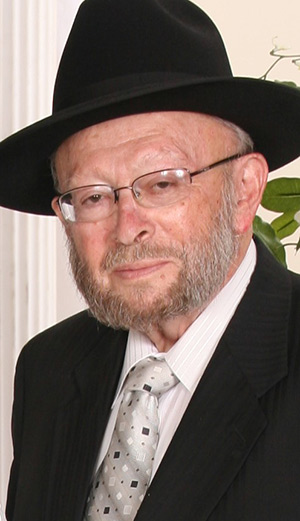In Memoriam - Rabbi Ephraim Oratz, zatzal
 How do you start to describe the one person most responsible for launching you on the path that has defined you for nearly a quarter century?
How do you start to describe the one person most responsible for launching you on the path that has defined you for nearly a quarter century?
I never had any great desire to be a classroom teacher until I found myself under the tutelage of Rabbi Ephraim Oratz, whose unparalleled pedagogic genius and vast reservoir of Torah knowledge inspired me to embark upon my career as a rebbe. Whatever I have accomplished in the field of Torah education is primarily because of him.
Rabbi Oratz was — if I may be permitted to use the term — the ultimate Torah-Renaissance man. He possessed the passion of the Amshinover chassidim, the yekkishe precision of the German Jews, the academic discipline of the Lithuanian scholars, and the worldly nobility of Rabbi Samson Rafael Hirsch, all rolled up — as Rabbi Shraga Feivel Mendelovitz would say — into one selfless, total servant of the Almighty.
Rabbi Oratz was truly of the “old school”, with countless stories about growing up in the post-depression years, about learning and teaching in the old American day school system, about playing stickball on the streets of New York. He told me once how his father had to go out every Monday morning to find new employment, because his Sabbath-observance cost him his job, time and time again. More incredibly, Rabbi Oratz didn’t learn of this until years later; his parents kept the children in the dark so they wouldn’t feel insecure.
“Coddling” was a word absent from Rabbi Oratz’s educational lexicon. He understood with every fiber of his being that self-esteem is not given; it is acquired by learning discipline and discovering the joy that comes from struggle and success. He never acknowledged good work with exuberant cries of “excellent”, “fantastic”, or “well done”. Instead, he responded with a silent nod, a quick smile, a short “nu, nu” or, on one extraordinary occasion, with “not bad, not bad at all”. That was high praise indeed.
There weren’t many things Rabbi Oratz didn’t understand. In two years of classes I never heard him unable to answer a question, although he could hold his tongue indefinitely when he wanted us to come up with the answers on our own.
There’s nothing more inspirational than witnessing a true master do something as well as it can be done. Watching Rabbi Oratz teach made me want to be a teacher. That was it. My course in life was set, without prompting, without a sales pitch, with just enough encouragement to convince me that I could succeed if I put my heart into it. And I wanted nothing more than to do what he could do, even if I did it only half as well he could.
“If you aren’t devoted to chinuch (teaching Torah)”, he once said to us, “please find a different profession. You can make more money doing almost anything else, and there’s no telling how much damage you might do if you go into teaching for the wrong reasons.”
He also taught me my signature phrase. “Of course it makes sense; you just don’t understand it.”
Then there was his distinctive way of dealing with latecomers. When a student came in during class, Rabbi Oratz would stop mid-sentence and follow the offender with his eyes until he had taken his place, pause for one beat, then continue where he had left off. Most memorable was the time a student came in only moments after he had explained this technique, allowing him to demonstrate to (almost) everyone’s delight, and to the latecomer’s consternation.
Rabbi Oratz did allow a shadow of emotion to creep over his face when he talked about the resistance to fire drills. “They all have the same rationale,” he would say, “Torah is a shemira (protection). I tell them they can say that after they’ve had to shepherd a class of little children down from the third floor of a smoke-filled building.”
When my first book, Dawn to Destiny, was in pre-production, Judaica Press contacted Rabbi Oratz and asked him to edit it. The publisher later told me that he was initially less-than-enthusiastic. But when he heard that the author was a former student, he agreed immediately. Several weeks later I called him to discuss his critique. He began by raising an objection to the first sentence of the introduction. This is going to be a long phone call, I told myself. And it was. But the finished product came out so much the better for having gone through Rabbi Oratz’s “trial-by-fire”.
It took me 17 years to get back to Israel after completing Ohr LaGolah. At my earliest opportunity I went to see Rabbi Oratz and thank him for all he had done for me. His response was completely in character. “Adaraba,” he said. Just the opposite.
And it was especially sweet when my daughter went off to learn in Israel at Darchei Binah seminary in Jerusalem. There’s something indescribable about having your child learn from your rebbe. I imagine that it’s even sweeter to teach the children of your students.
A generation comes and a generation goes; the sun also rises, and it sets. Rabbi Oratz returned to the yeshiva d’rakiya on Shabbat Vayislach, moving on to enjoy the rewards of a life devoted to the children of his people. And our world has grown darker as we try to carry the torch and safeguard the light of Torah for the generations yet to come.
May his neshama have an aliyah,and his family be comforted among the mourners of Tzion and Yerushalayim.
*An alumnus of both Ohr Somayach and Ohr Lagolah, Rabbi Yonason Goldson currently teaches in the Block Yeshiva High School in Missouri, and has authored a number of sefarim.






